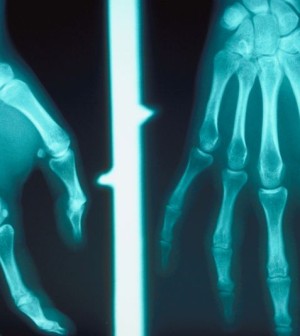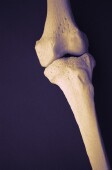- Stigma, Shame Hit Many Gay Men Affected by Mpox Outbreak
- Calories, Not Meal Timing, Key to Weight Loss: Study
- Dietary Changes May Beat Meds in Treating IBS
- Screen Pregnant Women for Syphilis, Ob-Gyn Group Advises
- Even With Weight Gain, Quitting Smoking in Pregnancy Still Best for Health
- A-Fib Is Strong Precursor to Heart Failure
- One Neurological Factor Keeps Black, Hispanic Patients From Alzheimer’s Clinical Trials
- Managing Blood Sugar After Stroke Could Be Key to Outcomes
- Dozens of COVID Virus Mutations Arose in Man With Longest Known Case
- Blood Test Might Someday Diagnose Early MS
Strong Bones After 50? Women May Not Need Next Test Until 65


A postmenopausal woman who is 50 and still shows “normal” readings on her bone density test may not need her next such test for 10 or even 15 years, a new study finds.
However, researchers led by Dr. Margaret Gourlay of the University of North Carolina at Chapel Hill stressed that younger women who do show signs of bone loss are at high risk for a major fracture, and do require regular testing.
The study involved almost 4,100 postmenopausal American women between the ages of 50 and 64 who took part in the ongoing Women’s Health Initiative study.
All of the women had undergone a bone mineral density test to assess their risk for fractures and osteoporosis. The women were not taking hormones, calcium or vitamin D supplements. They also had never had a broken bone, the team said.
The results: Among women whose tests showed no signs of osteoporosis, it took nearly 13 years for just 1 percent of the youngest women, and almost eight years for 1 percent of the oldest women, to suffer a spinal fracture or broken hip.
It also took roughly 12 years for 3 percent of the younger women and nearly nine years for 3 percent of the older women without osteoporosis to sustain a spinal fracture or break a hip, wrist or arm, Gourlay’s team said.
The researchers believe that — barring significant health issues — younger postmenopausal women with no sign of osteoporosis do not need a repeat bone mineral density test for 10 to 15 years.
The study was funded by the U.S. National Institutes of Health and published in the June issue of Menopause.
Two experts in women’s health says the new study gives older women valuable guidance.
“In the past, both physicians and their patients have been led to believe that bone mineral density testing should be performed routinely — even as often as every two years,” said Dr. Rebecca Brightman, an assistant clinical professor of obstetrics, gynecology and reproductive science at the Icahn School of Medicine at Mount Sinai, in New York City.
The timing of osteoporosis testing should always be a decision made by a woman and her doctor, she said. However, the new study suggests that, “if a recently menopausal woman has a normal bone density she may be able to wait up to 10-15 years before it is repeated,” Brightman said.
Dr. Caroline Messer is an endocrinologist at Lenox Hill Hospital, also in New York City. She believes the study does have “one major drawback,” in that it only looked at the time elapsed until a woman experienced a fracture — not until she first showed signs of bone loss or osteoporosis.
So, “screening at shorter intervals may confer additional benefits beyond short-term fracture risk reduction,” Messer explained. Catching bone loss before it progresses might help prevent osteoporosis, which in turn might prevent fractures from occurring, she explained.
The study authors also stressed that women whose bones already showed signs of weakening at the time of their first bone test will need to be monitored more closely. Women who had osteoporosis when the study began were at much higher risk for broken bones — within just three years, 1 percent of these women suffered a major fracture, the authors said. By 2.5 years, a full 3 percent of these women had such an injury.
More information
The U.S. National Institute of Arthritis and Musculoskeletal and Skin Diseases provides more information on osteoporosis.
Source: HealthDay
Copyright © 2024 HealthDay. All rights reserved.










